 Technology peripherals
Technology peripherals
 AI
AI
 Paid galleries collectively ban AI-generated images, and netizens' dreams of earning copyright fees are shattered
Paid galleries collectively ban AI-generated images, and netizens' dreams of earning copyright fees are shattered
Paid galleries collectively ban AI-generated images, and netizens' dreams of earning copyright fees are shattered
Let AI draw and earn copyright fees by yourself?
Someone is already doing it.
Recently, some media have revealed that more and more artists are submitting to the image licensing platform Shutterstock. Most of their images are generated by Midjourney and Stable Diffusion. Searching for keywords on the platform once yielded thousands of results.
According to the sharing rules, if someone uses it and pays the fee, the original author can get 15%-40% of the income.

# In order to encourage more people to join, a photographer specially shared the method "How to earn income from selling AI paintings on Shutterstock" on YouTube. In the video, she called on everyone to try creating with tools such as Midjourney because it is "convenient and fast."
This is almost the hottest AI creation topic recently. On Reddit alone, it received 700 likes and 200 comments in less than a day.
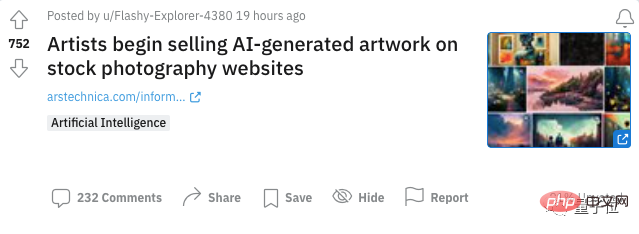
#Some people think that creating images on demand and paying for them certainly makes sense.
Some netizens lamented: Is it too late to refund my art degree now?
However, just when the art creators were excited about new income-
The platform suddenly dropped a heavy hammer and shattered their "dream of making money."
Sudden ban
On September 21, Getty abruptly announced a ban on uploading and selling images generated using AI.
This means that works generated by tools such as DALL-E, Midjourney and Stable Diffusion will not be able to be uploaded and earn any income. Not only that, all AI-generated images previously uploaded to the platform will also be deleted.
Currently, when searching for keywords such as AI generated and Midjourney on Getty and its iStock platform, it is almost impossible to see AI-generated works.
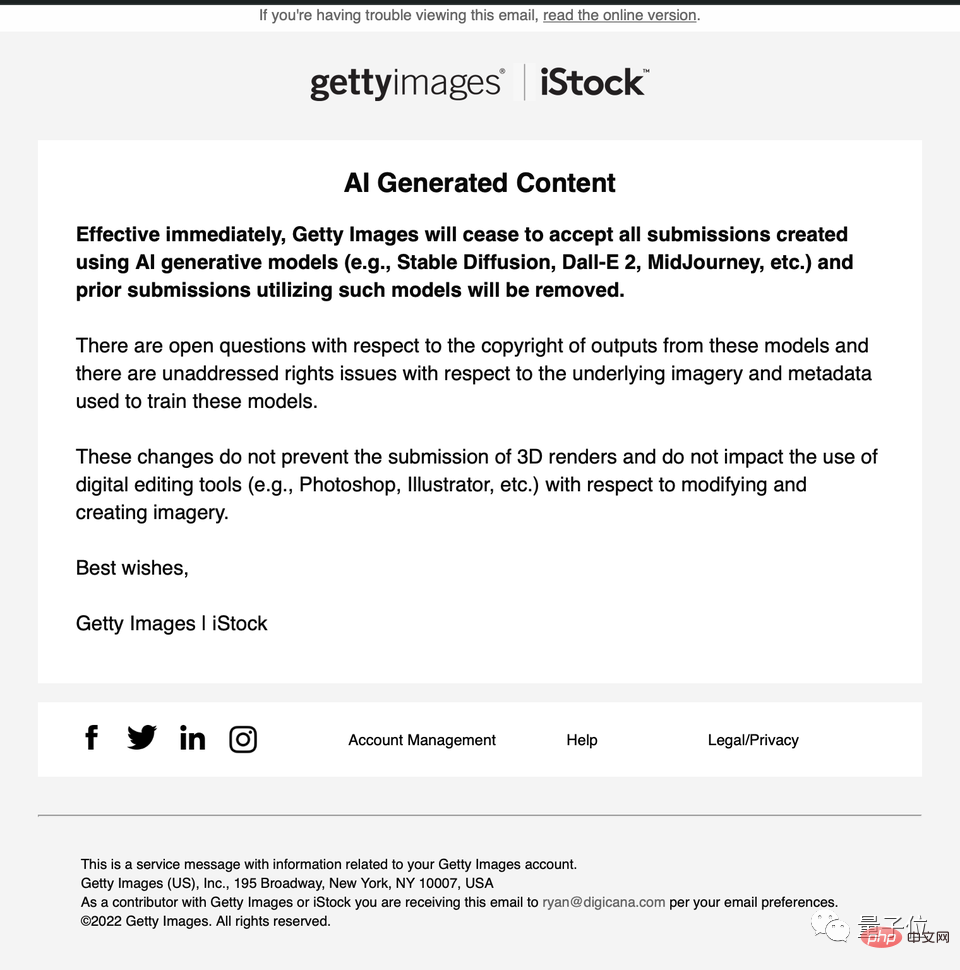
Following Getty, other photo websites such as Newgrounds, PurplePort, and FurAffinity also made similar decisions.
The Shutterstock platform, which artists have high hopes for, is also quietly taking action.
Many people have discovered that Shutterstock is also delisting some AI-generated content, as early as September 19.
Although some creators later exposed Shutterstock and restored some Midjourney-generated images, quite a few images were still removed from the shelves. Using Midjourney as the keyword, the number of search results is not as good as before.
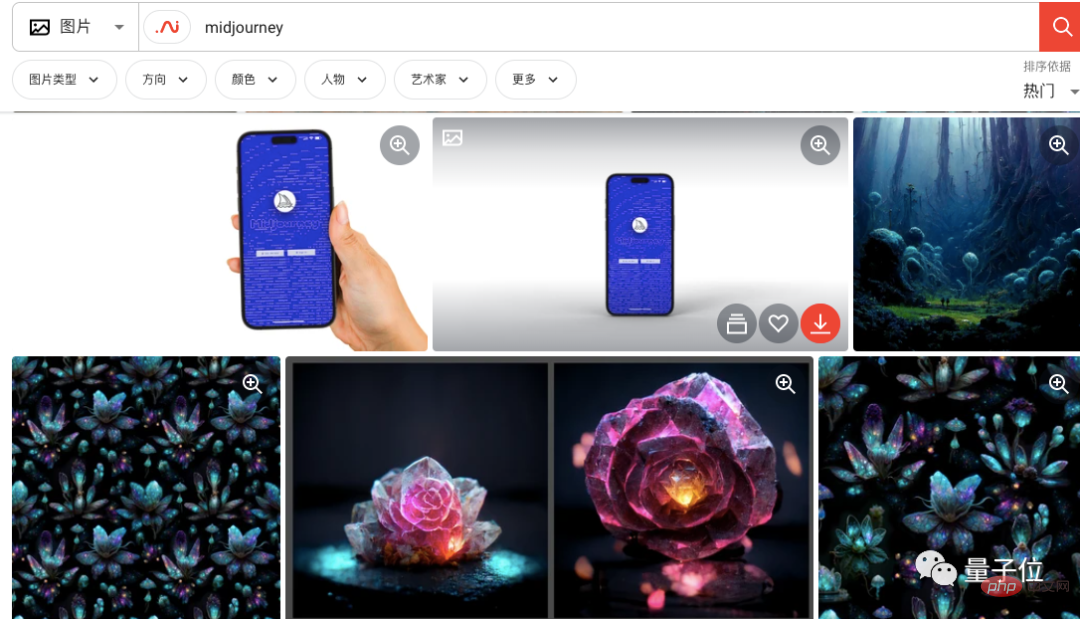
Regarding the reason for the ban, Getty gave a more detailed explanation.
Its CEO explained: "This is due to concerns about the legality of AI-generated content, and also hopes to protect platform customers."
He also added that the platform’s concerns are not only about the copyright of the model itself, but also about the unresolved copyright of the generated pictures, training pictures and personal portraits included. If such images are allowed to be sold, the platform will also face relevant legal risks.
But Getty said there will be no restrictions on the use of digital tools to edit and render original image content.
It is worth adding that since some AI-generated pictures can still be seen, it seems that the platform is still exploring more specific ban limits.
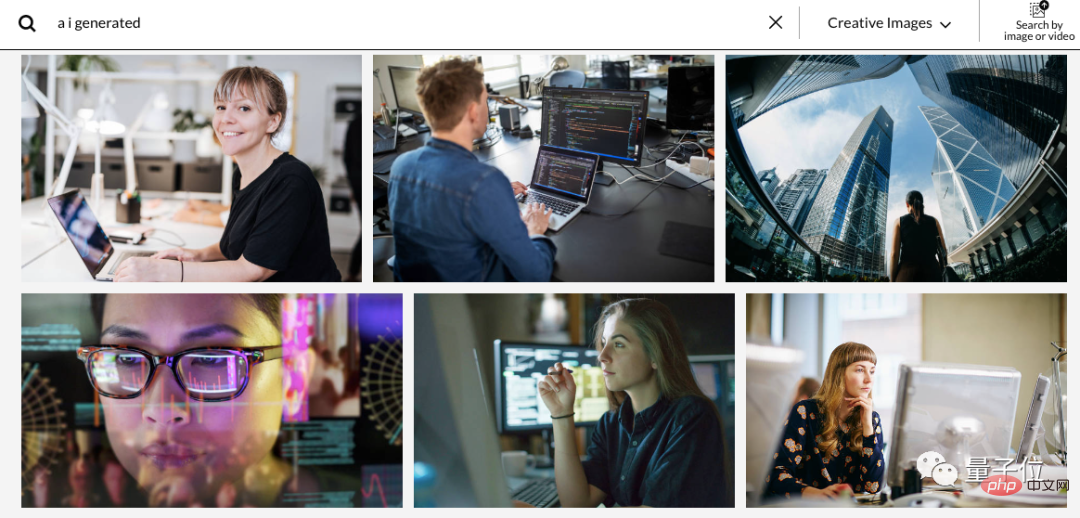
#In fact, from the perspective of the platform, their explanation is not groundless.
Among the many AI-generated pictures, many of them do have Getty watermarks, which means that these training pictures have probably never been authorized by the platform.
In addition, the use of infringing portrait images to train AI has always existed, with constant controversy, and even the incident of "private medical images being used for training" was exposed.
According to an AI artist, she discovered that there were photos of her private medical treatment taken in 2013 in the LAION data set.
At that time, she needed surgery due to illness, and related photos were taken for therapeutic purposes, but she never authorized them to be made public. On social media, the artist posted a release form.
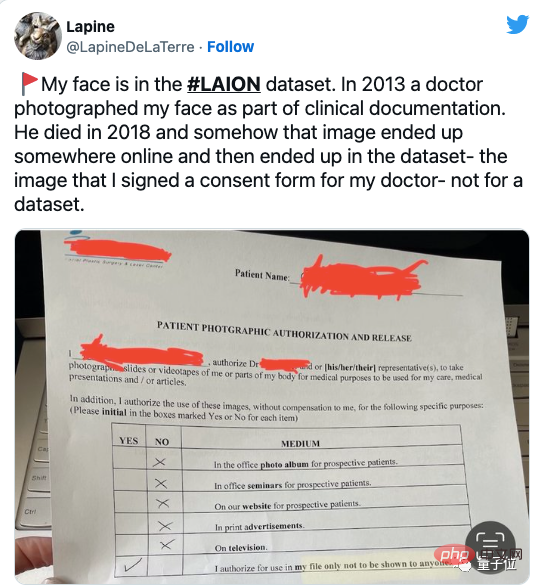
On the Internet, the LAION data set can be publicly crawled and used, and the media has revealed that it is one of the training sets for image generation models such as Stable Diffusion and Google Imagen. one.
This matter has attracted a lot of attention. Some media even found pictures of thousands of similar cases in the LAION data set——
In some images, the person involved is lying on a hospital bed with medical hoses and wires attached to his body without any coding and blur processing:
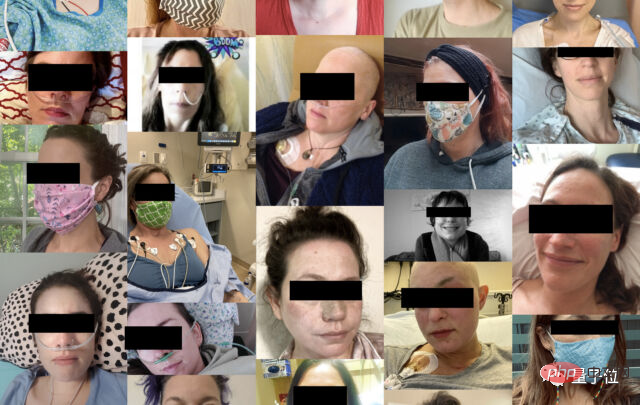
△Picture from arstechnica, for the purpose of protecting the parties concerned, they added a black bar
The legality of AI-generated pictures needs to be clarified
How can AI-generated pictures be legal? Someone pointed out on Reditt -
On the one hand, sellers need to ensure that the training framework is open source and commercially available, such as TF and Pytorch; on the other hand, the images used for training must also have no copyright risks and meet these two requirements. point, then reselling is legal.
But in practice, the problem is very complicated.
Regardless of the framework, it is difficult to confirm the legality of the copyright of the data set used by the AI team. The LAION data set mentioned above is a typical case.
For more AI tool users, they may not have a clear and in-depth understanding of the technology and operations, so it is difficult to trace whether the AI tool data set is compliant or not.
Looking at it this way, the platform simply banned it as a last resort.
What is unavoidable is that regardless of whether the laws and regulations in various fields keep up, AI painting is already being used on a large scale.
A publishing practitioner shared that his organization employs dozens of art editors, but it also uses AI to generate pictures for editors to select. He predicts that this tool may create a surplus of practitioners in the field of American editing in the future.
It is worth mentioning that on Friday, September 23, the copyright of the first AI-generated artwork was successfully registered.
An artist named Kris Kashtanova created a graphic novel using Midjourney, and they found a lawyer friend and successfully registered it with the Copyright Office.
However, she also added that her work was not entirely created by AI. She wrote the story, selected the generated images, and then put them together.
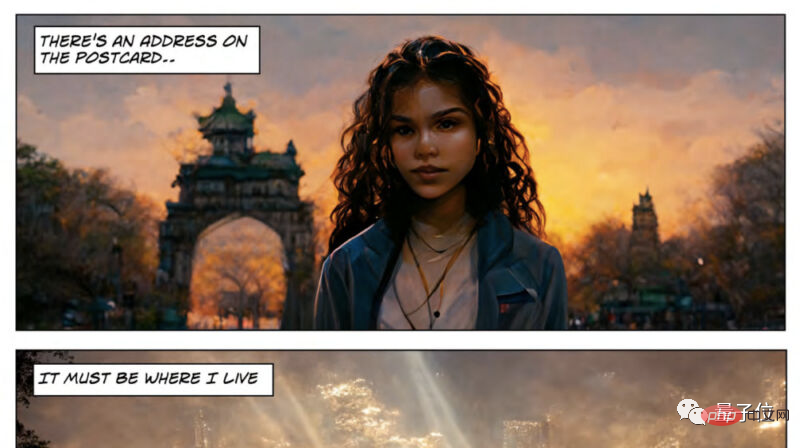
It is foreseeable that the scope of AI-generated images will be wider, and the fire of controversy is bound to become more and more intense.
So, what do you think?
Reference link:
[1]https://www.reddit.com/r/StableDiffusion/comments/xk6car/getty_images_istock_stops_accepting_ai_imagery/
[2]https:/ /www.theverge.com/2022/9/21/23364696/getty-images-ai-ban-generated-artwork-illustration-copyright?scrolla=5eb6d68b7fedc32c19ef33b4
[3]https://petapixel.com /2022/09/21/getty-images-ban-ai-generated-pictures-shutterstock-following-suit/
[4]https://petapixel.com/2022/09/16/thousands- of-ai-generated-images-are-for-sale-on-stock-photo-websites/
The above is the detailed content of Paid galleries collectively ban AI-generated images, and netizens' dreams of earning copyright fees are shattered. For more information, please follow other related articles on the PHP Chinese website!

Hot AI Tools

Undresser.AI Undress
AI-powered app for creating realistic nude photos

AI Clothes Remover
Online AI tool for removing clothes from photos.

Undress AI Tool
Undress images for free

Clothoff.io
AI clothes remover

AI Hentai Generator
Generate AI Hentai for free.

Hot Article

Hot Tools

Notepad++7.3.1
Easy-to-use and free code editor

SublimeText3 Chinese version
Chinese version, very easy to use

Zend Studio 13.0.1
Powerful PHP integrated development environment

Dreamweaver CS6
Visual web development tools

SublimeText3 Mac version
God-level code editing software (SublimeText3)

Hot Topics
 What are the types of return values of c language function? Summary of types of return values of c language function?
Apr 03, 2025 pm 11:18 PM
What are the types of return values of c language function? Summary of types of return values of c language function?
Apr 03, 2025 pm 11:18 PM
The return value types of C language function include int, float, double, char, void and pointer types. int is used to return integers, float and double are used to return floats, and char returns characters. void means that the function does not return any value. The pointer type returns the memory address, be careful to avoid memory leakage.结构体或联合体可返回多个相关数据。
 Concept of c language function
Apr 03, 2025 pm 10:09 PM
Concept of c language function
Apr 03, 2025 pm 10:09 PM
C language functions are reusable code blocks. They receive input, perform operations, and return results, which modularly improves reusability and reduces complexity. The internal mechanism of the function includes parameter passing, function execution, and return values. The entire process involves optimization such as function inline. A good function is written following the principle of single responsibility, small number of parameters, naming specifications, and error handling. Pointers combined with functions can achieve more powerful functions, such as modifying external variable values. Function pointers pass functions as parameters or store addresses, and are used to implement dynamic calls to functions. Understanding function features and techniques is the key to writing efficient, maintainable, and easy to understand C programs.
 How to calculate c-subscript 3 subscript 5 c-subscript 3 subscript 5 algorithm tutorial
Apr 03, 2025 pm 10:33 PM
How to calculate c-subscript 3 subscript 5 c-subscript 3 subscript 5 algorithm tutorial
Apr 03, 2025 pm 10:33 PM
The calculation of C35 is essentially combinatorial mathematics, representing the number of combinations selected from 3 of 5 elements. The calculation formula is C53 = 5! / (3! * 2!), which can be directly calculated by loops to improve efficiency and avoid overflow. In addition, understanding the nature of combinations and mastering efficient calculation methods is crucial to solving many problems in the fields of probability statistics, cryptography, algorithm design, etc.
 distinct function usage distance function c usage tutorial
Apr 03, 2025 pm 10:27 PM
distinct function usage distance function c usage tutorial
Apr 03, 2025 pm 10:27 PM
std::unique removes adjacent duplicate elements in the container and moves them to the end, returning an iterator pointing to the first duplicate element. std::distance calculates the distance between two iterators, that is, the number of elements they point to. These two functions are useful for optimizing code and improving efficiency, but there are also some pitfalls to be paid attention to, such as: std::unique only deals with adjacent duplicate elements. std::distance is less efficient when dealing with non-random access iterators. By mastering these features and best practices, you can fully utilize the power of these two functions.
 What are the differences and connections between c and c#?
Apr 03, 2025 pm 10:36 PM
What are the differences and connections between c and c#?
Apr 03, 2025 pm 10:36 PM
Although C and C# have similarities, they are completely different: C is a process-oriented, manual memory management, and platform-dependent language used for system programming; C# is an object-oriented, garbage collection, and platform-independent language used for desktop, web application and game development.
 What does the c language function return pointer output?
Apr 03, 2025 pm 11:36 PM
What does the c language function return pointer output?
Apr 03, 2025 pm 11:36 PM
The C language function returns a pointer to output a memory address. The pointing content depends on the operation inside the function, which may point to local variables (be careful, memory has been released after the function ends), dynamically allocated memory (must be allocated with malloc and free), or global variables.
 What are the pointer parameters in the parentheses of the C language function?
Apr 03, 2025 pm 11:48 PM
What are the pointer parameters in the parentheses of the C language function?
Apr 03, 2025 pm 11:48 PM
The pointer parameters of C language function directly operate the memory area passed by the caller, including pointers to integers, strings, or structures. When using pointer parameters, you need to be careful to modify the memory pointed to by the pointer to avoid errors or memory problems. For double pointers to strings, modifying the pointer itself will lead to pointing to new strings, and memory management needs to be paid attention to. When handling pointer parameters to structures or arrays, you need to carefully check the pointer type and boundaries to avoid out-of-bounds access.
 What are the formats of function definition in C language?
Apr 03, 2025 pm 11:51 PM
What are the formats of function definition in C language?
Apr 03, 2025 pm 11:51 PM
The key elements of C function definition include: return type (defining the value returned by the function), function name (following the naming specification and determining the scope), parameter list (defining the parameter type, quantity and order accepted by the function) and function body (implementing the logic of the function). It is crucial to clarify the meaning and subtle relationship of these elements, and can help developers avoid "pits" and write more efficient and elegant code.





